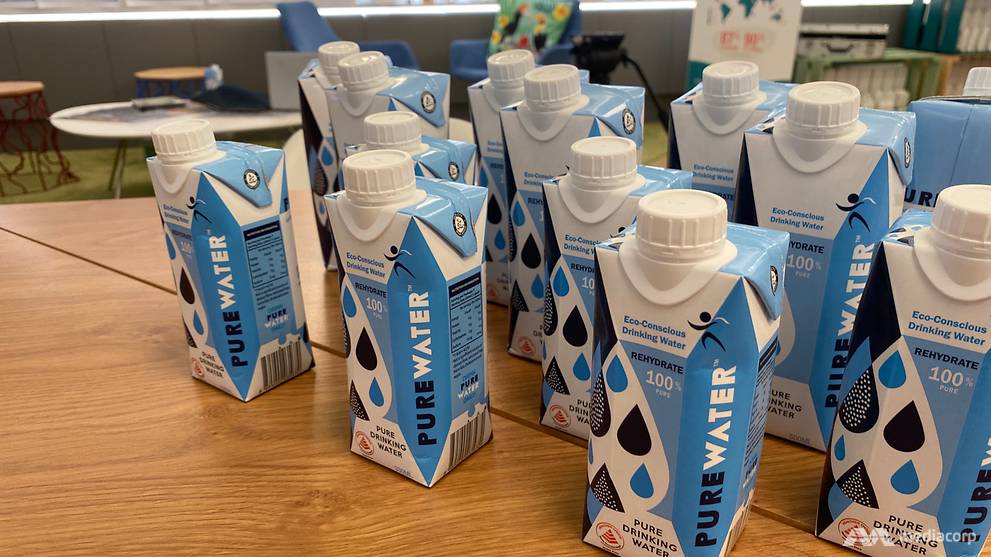
SINGAPORE: Would you pay more for packaging if you knew it was environmentally friendly?
Polar Water is confident that Singaporean consumers are ready to do so, as they rolled out their new line of carton-packaged water on Tuesday (Dec 3).
AdvertisementAdvertisementThe new packaging, manufactured by Tetra Pak, is 70 per cent renewable, with paper-based cartons and caps made from sugar cane derivatives, said Polar Water in a media release.
All this comes at a cost though.
The 330ml and 500ml PUREWATER boxed water is priced at S$0.80 and S$1.20 respectively.
In comparison, a bottle of water typically costs between S$0.40 and S$0.70.
AdvertisementAdvertisement[h=3]READ: Plastic bag charge trial extended for one year to 25 FairPrice stores[/h]Although tap water in Singapore is safe to drink, Singapore imports about 17 million bottles of water per month from Malaysia alone, said Mr Masagos Zulkifli in a written parliamentary reply in November, citing statistics from the Singapore Food Agency.
With dozens of bottled water brands on display in supermarket aisles, the use of plastic, including PET bottles, has been cited as a threat to the environment in Singapore’s Zero Waste Masterplan.
From 2021, companies that use packaging will be required to submit an annual report on the amount of packaging in their products as well as their packaging waste reduction plans.
According to Tetra Pak’s website, the packaging carbon footprint of a 500ml carton with a plant-based cap is 22g of CO2, based on life cycle assessment studies conducted in Europe.
A REPLACEMENT FOR BOTTLED WATER
Responding to questions on the relative environmental impact of paper-based cartons compared to that of PET bottles, Ms Rena Chua, the brand and marketing manager of PUREWATER, said that while the cartons are meant to be a replacement for bottled water, they will also be more expensive.
The cost of using the paper-based cartons is “significantly higher”, said Ms Chua.
“PET is so common. If you go to any supermarket or restaurant, you will still see PET bottles ... It has been around for so long,” she said, acknowledging that Polar Water still uses PET bottles for its other products.
“And of course, the cost is definitely lower because of the economies of scale. The more plastic you use, the cheaper it would be.”
[h=3]READ: Singapore to reduce Semakau waste by 30% under first Zero Waste Master Plan[/h][h=3]READ: Could more be done to reduce plastic packaging waste in Singapore's supermarkets?[/h]But Ms Chua also said that she is confident consumers will be willing to pay “a bit more” to do their part for the environment.
“They’re willing to pay that slight amount because to them 30 cents or 40 cents might not be a big deal. It’s a very conscious decision," said Ms Chua.
Ms Chua noted that consumers are typically willing to pay higher prices for similarly packaged drinks such as coconut water or juices,
In the long run, she hopes that this paper-based packaging will be more widely adopted in Singapore, allowing for improved economies of scale.
“This price will definitely go down once people know that this is good packaging and the (number of) people using it grows. Just like PET, I believe that the price will go down and it will benefit the consumer in the long run.”
The 330ml cartons are now available in NTUC FairPrice stores, and the 500ml cartons will be on shelves in a few weeks' time.
The feedback so far has been encouraging, said Ms Chua.
"People are interested and people are willing to buy," said Ms Chua, adding that the company has deliberately kept prices affordable to extend reach.
“We don’t want to overprice it and make people think it is very expensive. So we are still finding ways to lower the cost,” she added.
“If you compare this to the whole company’s water sales, this is not even 2 to 3 per cent. But we feel that it’s a good start.”
To lower costs, PUREWATER is produced in Malaysia and then imported into Singapore for sale.
The machinery required to produce the paper-based cartons is also located in Malaysia, said Ms Chua.
POLAR WATER EXPLORING MORE OPTIONS, INCLUDING ALUMINIUM CANS
Looking forward, Polar Water is currently exploring alternative options for packaging its water, including in aluminium cans, which are completely recyclable.
However, the metallic taste of aluminium could pose some challenges because water is tasteless, said Ms Chua.
Let's block ads! (Why?)
More...


